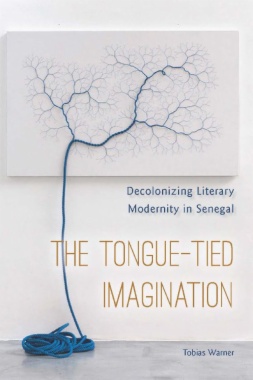Should a writer work in a former colonial language or in a vernacular? The language question was one of the great, intractable problems that haunted postcolonial literatures in the twentieth century, but it has since acquired a reputation as a dead end for narrow nationalism. This book returns to the language question from a fresh perspective. Instead of asking whether language matters, The Tongue-Tied Imagination explores how the language question itself came to matter.
Focusing on the case of Senegal, Warner investigates the intersection of French and Wolof. Drawing on extensive archival research and an under-studied corpus of novels, poetry, and films in both languages, as well as educational projects and popular periodicals, the book traces the emergence of a politics of language from colonization through independence to the era of neoliberal development. Warner reads the francophone works of well-known authors such as Léopold Senghor, Ousmane Sembène, Mariama Bâ, and Boubacar Boris Diop alongside the more overlooked Wolof-language works with which they are in dialogue.
Refusing to see the turn to vernacular languages only as a form of nativism, The Tongue-Tied Imagination argues that the language question opens up a fundamental struggle over the nature and limits of literature itself. Warner reveals how language debates tend to pull in two directions: first, they weave vernacular traditions into the normative patterns of world literature; but second, they create space to imagine how literary culture might be configured otherwise. Drawing on these insights, Warner brilliantly rethinks the terms of world literature and charts a renewed practice of literary comparison.
- Cover�������������������������������
- THE TONGUE-TIED IMAGINATION�������������������������������������������������������������������������������������������������
- Title�������������������������������
- Copyright�������������������������������������������
- Dedication����������������������������������������������
- CONTENTS����������������������������������������
- Note on Orthography and Pronunciation�������������������������������������������������������������������������������������������������������������������������������
- Introduction: Unwinding the Language Question�������������������������������������������������������������������������������������������������������������������������������������������������������
- Part I COLONIAL LITERARY MODERNITY����������������������������������������������������������������������������������������������������������������������
- 1. The Fetish of Textuality: David Boilat’s Notebooks and the Making of a Literary Past�������������������������������������������������������������������������������������������������������������������������������������������������������������������������������������������������������������������������������������������������������������������������������������
- 2. Para-literary Authorship: Colonial Education and the Uses of Literature
- 3. Toward the Future Reader: Print Networks and the Question of the Audience����������������������������������������������������������������������������������������������������������������������������������������������������������������������������������������������������������������������������������������������������
- Part II DECOLONIZATION AND THE LANGUAGE QUESTION����������������������������������������������������������������������������������������������������������������������������������������������������������������
- 4. Senghor’s Grammatology: The Political Imaginaries of Writing African Languages�������������������������������������������������������������������������������������������������������������������������������������������������������������������������������������������������������������������������������������������������������������������
- 5. Counterpoetics: Translation as Aesthetic Constraint in Sembène’s Mandabi and Ndao’s Buur Tilleen�������������������������������������������������������������������������������������������������������������������������������������������������������������������������������������������������������������������������������������������������������������������������������������������������������������������������
- Part III WORLD LITERATURE, NEOLIBERALISM����������������������������������������������������������������������������������������������������������������������������������������
- 6. How Mariama Bâ Became World Literature: Translation and the Legibility of Feminist Critique
- 7. Aesthetics After Austerity: Boubacar Boris Diop and the Work of Literature in Neoliberal Senegal�������������������������������������������������������������������������������������������������������������������������������������������������������������������������������������������������������������������������������������������������������������������������������������������������������������������������
- Epilogue. Out of Time: Decolonization and the Future of World Literature����������������������������������������������������������������������������������������������������������������������������������������������������������������������������������������������������������������������������������������
- Acknowledgments
- Notes�������������������������������
- Bibliography����������������������������������������������������
- Index�������������������������������

